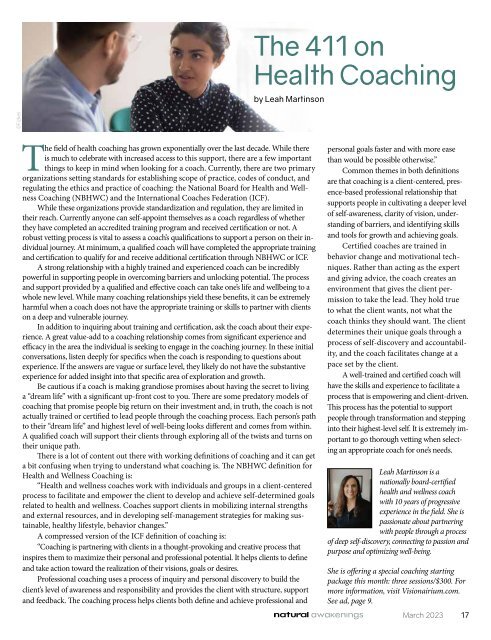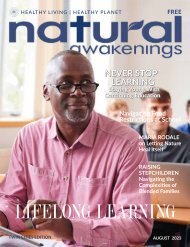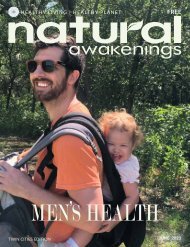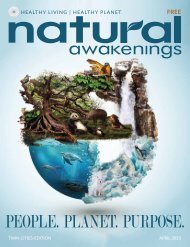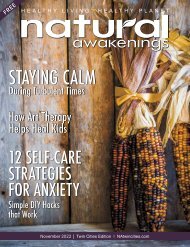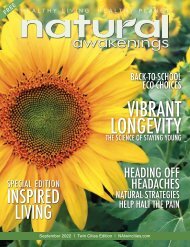Natural Awakenings Twin Cities March 2023
Read the March 2023 edition of Natural Awakenings Twin Cities magazine. This is our annual Food and Nutrition Issue which features articles on plant-based resources, veggies for the win, supplements that help the heart, organs of detoxification, health coaching, releasing emotional baggage, human-grade dog foods, eco-friendly water heating and so much more! Be sure to check out our local content, including News Briefs announcements, Community Resource Guide with providers throughout the metro who can meet your individual wellness needs, and all the happenings in the Calendar of Events. There is additional online-only content that can be found at NATwinCities.com.
Read the March 2023 edition of Natural Awakenings Twin Cities magazine. This is our annual Food and Nutrition Issue which features articles on plant-based resources, veggies for the win, supplements that help the heart, organs of detoxification, health coaching, releasing emotional baggage, human-grade dog foods, eco-friendly water heating and so much more!
Be sure to check out our local content, including News Briefs announcements, Community Resource Guide with providers throughout the metro who can meet your individual wellness needs, and all the happenings in the Calendar of Events. There is additional online-only content that can be found at NATwinCities.com.
You also want an ePaper? Increase the reach of your titles
YUMPU automatically turns print PDFs into web optimized ePapers that Google loves.
The 411 on<br />
Health Coaching<br />
by Leah Martinson<br />
©Fizkes<br />
The field of health coaching has grown exponentially over the last decade. While there<br />
is much to celebrate with increased access to this support, there are a few important<br />
things to keep in mind when looking for a coach. Currently, there are two primary<br />
organizations setting standards for establishing scope of practice, codes of conduct, and<br />
regulating the ethics and practice of coaching: the National Board for Health and Wellness<br />
Coaching (NBHWC) and the International Coaches Federation (ICF).<br />
While these organizations provide standardization and regulation, they are limited in<br />
their reach. Currently anyone can self-appoint themselves as a coach regardless of whether<br />
they have completed an accredited training program and received certification or not. A<br />
robust vetting process is vital to assess a coach’s qualifications to support a person on their individual<br />
journey. At minimum, a qualified coach will have completed the appropriate training<br />
and certification to qualify for and receive additional certification through NBHWC or ICF.<br />
A strong relationship with a highly trained and experienced coach can be incredibly<br />
powerful in supporting people in overcoming barriers and unlocking potential. The process<br />
and support provided by a qualified and effective coach can take one’s life and wellbeing to a<br />
whole new level. While many coaching relationships yield these benefits, it can be extremely<br />
harmful when a coach does not have the appropriate training or skills to partner with clients<br />
on a deep and vulnerable journey.<br />
In addition to inquiring about training and certification, ask the coach about their experience.<br />
A great value-add to a coaching relationship comes from significant experience and<br />
efficacy in the area the individual is seeking to engage in the coaching journey. In these initial<br />
conversations, listen deeply for specifics when the coach is responding to questions about<br />
experience. If the answers are vague or surface level, they likely do not have the substantive<br />
experience for added insight into that specific area of exploration and growth.<br />
Be cautious if a coach is making grandiose promises about having the secret to living<br />
a “dream life” with a significant up-front cost to you. There are some predatory models of<br />
coaching that promise people big return on their investment and, in truth, the coach is not<br />
actually trained or certified to lead people through the coaching process. Each person’s path<br />
to their “dream life” and highest level of well-being looks different and comes from within.<br />
A qualified coach will support their clients through exploring all of the twists and turns on<br />
their unique path.<br />
There is a lot of content out there with working definitions of coaching and it can get<br />
a bit confusing when trying to understand what coaching is. The NBHWC definition for<br />
Health and Wellness Coaching is:<br />
“Health and wellness coaches work with individuals and groups in a client-centered<br />
process to facilitate and empower the client to develop and achieve self-determined goals<br />
related to health and wellness. Coaches support clients in mobilizing internal strengths<br />
and external resources, and in developing self-management strategies for making sustainable,<br />
healthy lifestyle, behavior changes.”<br />
A compressed version of the ICF definition of coaching is:<br />
“Coaching is partnering with clients in a thought-provoking and creative process that<br />
inspires them to maximize their personal and professional potential. It helps clients to define<br />
and take action toward the realization of their visions, goals or desires.<br />
Professional coaching uses a process of inquiry and personal discovery to build the<br />
client’s level of awareness and responsibility and provides the client with structure, support<br />
and feedback. The coaching process helps clients both define and achieve professional and<br />
personal goals faster and with more ease<br />
than would be possible otherwise.”<br />
Common themes in both definitions<br />
are that coaching is a client-centered, presence-based<br />
professional relationship that<br />
supports people in cultivating a deeper level<br />
of self-awareness, clarity of vision, understanding<br />
of barriers, and identifying skills<br />
and tools for growth and achieving goals.<br />
Certified coaches are trained in<br />
behavior change and motivational techniques.<br />
Rather than acting as the expert<br />
and giving advice, the coach creates an<br />
environment that gives the client permission<br />
to take the lead. They hold true<br />
to what the client wants, not what the<br />
coach thinks they should want. The client<br />
determines their unique goals through a<br />
process of self-discovery and accountability,<br />
and the coach facilitates change at a<br />
pace set by the client.<br />
A well-trained and certified coach will<br />
have the skills and experience to facilitate a<br />
process that is empowering and client-driven.<br />
This process has the potential to support<br />
people through transformation and stepping<br />
into their highest-level self. It is extremely important<br />
to go thorough vetting when selecting<br />
an appropriate coach for one’s needs.<br />
Leah Martinson is a<br />
nationally board-certified<br />
health and wellness coach<br />
with 10 years of progressive<br />
experience in the field. She is<br />
passionate about partnering<br />
with people through a process<br />
of deep self-discovery, connecting to passion and<br />
purpose and optimizing well-being.<br />
She is offering a special coaching starting<br />
package this month: three sessions/$300. For<br />
more information, visit Visionairium.com.<br />
See ad, page 9.<br />
<strong>March</strong> <strong>2023</strong><br />
17


